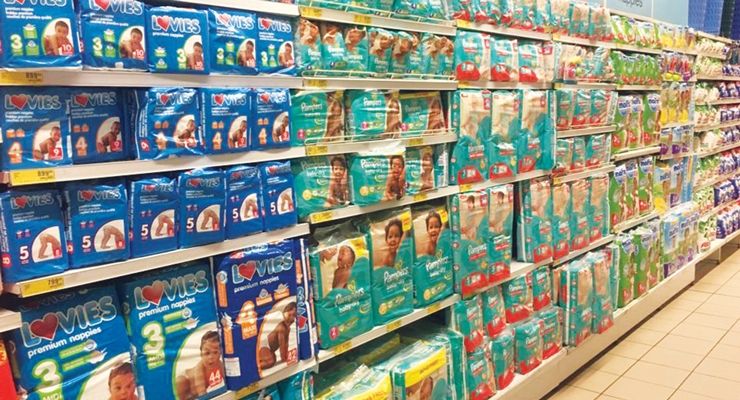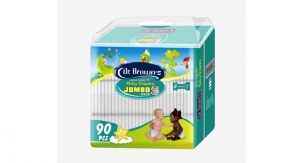Raymond Chimhandamba, Handas Consulting, South Africa08.05.19
Wemy Makes a Comeback
Wemy Industries is making a comeback by focusing on three categories and is poised to lead in two categories of the hygiene sector in Nigeria. Founded 35 years ago, Wemy Industries Limited is the foremost local pioneer manufacturer of baby diapers in Nigeria. With the brands Dr. Browns and Nightinale, which are well known to Nigerian consumers of baby care, feminine care and adult care products, Wemy has grown from a mono product company to a company that manufactures and trades over 15 product lines with a nationwide coverage. Today, the company owns a highly modernized world class factory in Lagos. In 2016, the company was one of the victims of the massive recession that hit the country and it had to lay off over 200 workers, according to a recent report in Business Day Nigeria.
Already leading the wet wipes category with a 19% market share, according to the most recent Euromonitor report, after a three year absence in baby care, Wemy Industries has re-launched its baby diapers in Nigeria and is also focusing on another hygiene category, adult diapers, according to a recent report by Business Day Nigeria. Wemy Industries’ strategy for the adult diaper category is to service the local Nigerian population as well as to target the rest of the ECOWAS market. Exports to the other markets within the same economic block of ECOWAS means that Wemy Industries pays no duties to export their products in high growth markets including Ghana, Cote d’Ivoire and Burkina Faso.
The machines for the adult diapers have already been purchased and the company awaits installation. This prepares them for a pole position in the adult diapers category as they will most likely be the only major regional manufacturer of adult diapers within the ECOWAS economic block. About 80% of the raw materials are imported, so exports will be a very key part of the business strategy as it will allow the business to earn foreign currency, while at the same time assisting the other countries in the economic block to obtain the products like adult diapers at better prices than they would pay by importing them from overseas. Most of the packaging is procured locally, as much as 60-70% on some lines but on some as little as 10%. This is likely to improve as there are plans that Dangote will be coming into this space soon, which will improve Wemy Industries’ backward integration in the next five years.
In the wipes category, Wemy has kept competition at bay by being the biggest local manufacturer and by keeping their prices highly competitive with imported brands. They plan to apply the same strategy of affordability with their re-launched baby diapers.
Before the recession, Wemy Industries employed 400 people and the company is rebuilding the business, hiring about 100 people in the last three months. There is talk of a public offering, to give the Nigerian consumers a chance to own and participate in this business. Wemy Industries’s current installed capacity is 700,000 diapers per day. In terms of support from government, the company hopes that the government will increase import tariffs to support local investors in the sector and also stop the imports of cheap B-grade diapers that come into the market.
P&G Closes Down Factory
According to a March report in Business Day Nigeria, P&G closed down its $300 million Agbara plant in July 2018. P&G had two baby diaper factories in Agbara and Ibadan and was the largest investor outside of the oil industry in Nigeria. According to the same report, reasons for the closure include “the company faced multiple taxation and harsh treatment at the hands of Nigeria Customs Service, which regularly acts as a revenue earner rather than a business facilitator. P&G also faced multiple taxes in Agbara where government agencies, who could not even build good roads, demanded huge taxes and levies.” P&G is currently importing product into the country.
For a long time, Pampers, P&G’s baby diaper brand, has been the market leader in Nigeria, Africa’s biggest economy, trailed by Huggies who was the second for many years. Competition has increased in recent years and in the last five to seven years Molfix, Hayat Kimya’s baby diaper brand in Nigeria, has become the market leader with more than 50% market share. Hayat Kimya is a Turkish conglomerate and the fifth largest diaper manufacturer in the world.
K-C to Rebuild
What makes the diaper market in Nigeria particularly interesting right now is that both companies that have traditionally been number one and two in the Nigerian market, P&G and Kimberly-Clark, have both closed their local diaper plants. They are both currently importing to the country.
According to reports, Kimberly-Clark closed their factory in Nigeria to invest in a new modern plant with enhanced technology and capabilities that will allow them to meet market demand owing to the increased demand for their products. The shutdown has affected about 60 employees. K-C is still committed to the Nigerian market and when they return they plan to have an even bigger commercial team than before and will open an additional office in Lagos.
Perhaps it is a good opportunity for Hayat Kimya, the owner Molfix, and Wemy Industries, to consolidate themselves. Both P&G and K-C are big global players, with deep pockets and big budgets in all the markets in which they play. It will be a very interesting time to see what happens when they return to the market. Hayat has also had a good chance to understand the market and indeed their skills applied in taking pole position in a short five years is proof of that. Wemy Industries, being a Nigerian business, also has the great advantage of being 100% local, giving them a bigger advantage of understanding the market like no other player. It will be a battle of budgets versus consumer understanding and insights. A most interesting development to see how things pan out.
Increasing Competition and Local Manufacturers
Several manufacturers and players in the baby diaper market are also fighting for their spot in Nigeria. Previous reports have indicated that the market has as much as 50 diaper brands, many which have a small marketshare Several established brands and newcomers are focusing on either local manufacturing in Nigeria or strong in-market presence through an import model. Virony Diapers, Sunda’s Softcare brands and Kiss Kids are some of the brands that are being manufactured locally or have recently entered the Nigerian market and are also present in other regional markets. Nigeria is a key hub for the West African sub-region while Kenya is a key hub for the East African regional hub.
With an increased number of players setting up local manufacturing, the government could be pressured to support these local investors against imports, as they are creating employment and perhaps paying more taxes. The managing director of Wemy Industries, Paul Odunaiya, has also recently raised this point whereby he was urging the government to intervene and stop the imports of cheap sub-standard baby diapers and the so-called B-grades, which are really diapers that are rejected on the production line.
Cross-Pollination Between Categories
If I put on my FMCG hat and I borrow ideas from the beverage category, here is what I see. In beverages there is an interesting way in which the channels feed off each other. If your brand is successful in the on-premise consumption channel, (which is the hotels, restaurants, cafes, fourcourts/petroleum food courts) basically the channels where the consumer buys and consumes the product straight away, you tend to see that the success trickles to retail. Better sales in on-premise channel translate into better sales in retail. I guess the logic is if more and more people are interacting with your brand in a club, restaurant or café and they like it, they are likely to buy it in bigger quantities when they see it in retail. So the two channels tend to feed off each other like that.
So back to hygiene. If I was P&G and K-C and stuck with an import model, with such strong brands, I would ensure that I use one category to hold shelf space for the other. Between baby diapers and wipes, wipes “travel better” than baby diapers. Put another way, you can load a lot more wipes in a container so that they cost less per unit to land them in Nigeria way cheaper than diapers. So if I was running out of stock on diapers because my containers are delayed, I would ensure that I use wipes to hold my retail space. The advantage here is also that the brands bear the same name. Huggies and Pampers. Just to ensure that my brand is still top of mind, even though the right category may not be readily available.
All eyes on Nigeria for the next three to five years!
Wemy Industries is making a comeback by focusing on three categories and is poised to lead in two categories of the hygiene sector in Nigeria. Founded 35 years ago, Wemy Industries Limited is the foremost local pioneer manufacturer of baby diapers in Nigeria. With the brands Dr. Browns and Nightinale, which are well known to Nigerian consumers of baby care, feminine care and adult care products, Wemy has grown from a mono product company to a company that manufactures and trades over 15 product lines with a nationwide coverage. Today, the company owns a highly modernized world class factory in Lagos. In 2016, the company was one of the victims of the massive recession that hit the country and it had to lay off over 200 workers, according to a recent report in Business Day Nigeria.
Already leading the wet wipes category with a 19% market share, according to the most recent Euromonitor report, after a three year absence in baby care, Wemy Industries has re-launched its baby diapers in Nigeria and is also focusing on another hygiene category, adult diapers, according to a recent report by Business Day Nigeria. Wemy Industries’ strategy for the adult diaper category is to service the local Nigerian population as well as to target the rest of the ECOWAS market. Exports to the other markets within the same economic block of ECOWAS means that Wemy Industries pays no duties to export their products in high growth markets including Ghana, Cote d’Ivoire and Burkina Faso.
The machines for the adult diapers have already been purchased and the company awaits installation. This prepares them for a pole position in the adult diapers category as they will most likely be the only major regional manufacturer of adult diapers within the ECOWAS economic block. About 80% of the raw materials are imported, so exports will be a very key part of the business strategy as it will allow the business to earn foreign currency, while at the same time assisting the other countries in the economic block to obtain the products like adult diapers at better prices than they would pay by importing them from overseas. Most of the packaging is procured locally, as much as 60-70% on some lines but on some as little as 10%. This is likely to improve as there are plans that Dangote will be coming into this space soon, which will improve Wemy Industries’ backward integration in the next five years.
In the wipes category, Wemy has kept competition at bay by being the biggest local manufacturer and by keeping their prices highly competitive with imported brands. They plan to apply the same strategy of affordability with their re-launched baby diapers.
Before the recession, Wemy Industries employed 400 people and the company is rebuilding the business, hiring about 100 people in the last three months. There is talk of a public offering, to give the Nigerian consumers a chance to own and participate in this business. Wemy Industries’s current installed capacity is 700,000 diapers per day. In terms of support from government, the company hopes that the government will increase import tariffs to support local investors in the sector and also stop the imports of cheap B-grade diapers that come into the market.
P&G Closes Down Factory
According to a March report in Business Day Nigeria, P&G closed down its $300 million Agbara plant in July 2018. P&G had two baby diaper factories in Agbara and Ibadan and was the largest investor outside of the oil industry in Nigeria. According to the same report, reasons for the closure include “the company faced multiple taxation and harsh treatment at the hands of Nigeria Customs Service, which regularly acts as a revenue earner rather than a business facilitator. P&G also faced multiple taxes in Agbara where government agencies, who could not even build good roads, demanded huge taxes and levies.” P&G is currently importing product into the country.
For a long time, Pampers, P&G’s baby diaper brand, has been the market leader in Nigeria, Africa’s biggest economy, trailed by Huggies who was the second for many years. Competition has increased in recent years and in the last five to seven years Molfix, Hayat Kimya’s baby diaper brand in Nigeria, has become the market leader with more than 50% market share. Hayat Kimya is a Turkish conglomerate and the fifth largest diaper manufacturer in the world.
K-C to Rebuild
What makes the diaper market in Nigeria particularly interesting right now is that both companies that have traditionally been number one and two in the Nigerian market, P&G and Kimberly-Clark, have both closed their local diaper plants. They are both currently importing to the country.
According to reports, Kimberly-Clark closed their factory in Nigeria to invest in a new modern plant with enhanced technology and capabilities that will allow them to meet market demand owing to the increased demand for their products. The shutdown has affected about 60 employees. K-C is still committed to the Nigerian market and when they return they plan to have an even bigger commercial team than before and will open an additional office in Lagos.
Perhaps it is a good opportunity for Hayat Kimya, the owner Molfix, and Wemy Industries, to consolidate themselves. Both P&G and K-C are big global players, with deep pockets and big budgets in all the markets in which they play. It will be a very interesting time to see what happens when they return to the market. Hayat has also had a good chance to understand the market and indeed their skills applied in taking pole position in a short five years is proof of that. Wemy Industries, being a Nigerian business, also has the great advantage of being 100% local, giving them a bigger advantage of understanding the market like no other player. It will be a battle of budgets versus consumer understanding and insights. A most interesting development to see how things pan out.
Increasing Competition and Local Manufacturers
Several manufacturers and players in the baby diaper market are also fighting for their spot in Nigeria. Previous reports have indicated that the market has as much as 50 diaper brands, many which have a small marketshare Several established brands and newcomers are focusing on either local manufacturing in Nigeria or strong in-market presence through an import model. Virony Diapers, Sunda’s Softcare brands and Kiss Kids are some of the brands that are being manufactured locally or have recently entered the Nigerian market and are also present in other regional markets. Nigeria is a key hub for the West African sub-region while Kenya is a key hub for the East African regional hub.
With an increased number of players setting up local manufacturing, the government could be pressured to support these local investors against imports, as they are creating employment and perhaps paying more taxes. The managing director of Wemy Industries, Paul Odunaiya, has also recently raised this point whereby he was urging the government to intervene and stop the imports of cheap sub-standard baby diapers and the so-called B-grades, which are really diapers that are rejected on the production line.
Cross-Pollination Between Categories
If I put on my FMCG hat and I borrow ideas from the beverage category, here is what I see. In beverages there is an interesting way in which the channels feed off each other. If your brand is successful in the on-premise consumption channel, (which is the hotels, restaurants, cafes, fourcourts/petroleum food courts) basically the channels where the consumer buys and consumes the product straight away, you tend to see that the success trickles to retail. Better sales in on-premise channel translate into better sales in retail. I guess the logic is if more and more people are interacting with your brand in a club, restaurant or café and they like it, they are likely to buy it in bigger quantities when they see it in retail. So the two channels tend to feed off each other like that.
So back to hygiene. If I was P&G and K-C and stuck with an import model, with such strong brands, I would ensure that I use one category to hold shelf space for the other. Between baby diapers and wipes, wipes “travel better” than baby diapers. Put another way, you can load a lot more wipes in a container so that they cost less per unit to land them in Nigeria way cheaper than diapers. So if I was running out of stock on diapers because my containers are delayed, I would ensure that I use wipes to hold my retail space. The advantage here is also that the brands bear the same name. Huggies and Pampers. Just to ensure that my brand is still top of mind, even though the right category may not be readily available.
All eyes on Nigeria for the next three to five years!


















